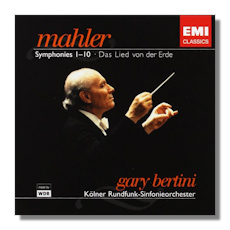
The Internet's Premier Classical Music Source
Related Links
- Mahler Reviews
- Latest Reviews
- More Reviews
-
By Composer
-
Collections
DVD & Blu-ray
Books
Concert Reviews
Articles/Interviews
Software
Audio
Search Amazon
Recommended Links
Site News
 CD Review
CD Review
Gustav Mahler

Complete Symphonies
- Symphony #1 "Titan"
- Symphony #2 "Resurrection" 1,2
- Symphony #3 4
- Symphony #4 5
- Symphony #5
- Symphony #6 "Tragic"
- Symphony #7
- Symphony #8 "Symphony of a Thousand" 3,6
- Symphony #9
- Symphony #10: Adagio
- Das Lied der Erde 7
1 Krisztina Laki, soprano
2,6 Florence Quivar, mezzo-soprano
4 Gwendolyn Killebrew, contralto
5 Lucia Popp, soprano
6 Julia Varady, Marianne Haggander & Maria Venuti, sopranos
6 Ann Howells, alto
6 Paul Frey, tenor
6 Alan Titus, baritone
6 Siegfried Vogel bass
7 Marjana Lipovšek, mezzo-soprano
7 Ben Heppner, tenor
3 Cologne Radio Choir
3 Südfunk Choir, Stuttgart
4 Boys' Choir of the Collegium Josephinum, Bonn
4 Women's Choir of the Bavarian & West German Radio
6 The Little Singers of Tokyo
6 Prague Philharmonic Choir
WDR Radio Symphony Orchestra, Cologne/Gary Bertini
EMI Classics 09463402382 11CDs
This set has been around for a while now, but when it first came out in 2005, it had been almost impossible to find all of these recordings in one place. They had been distributed by various labels affiliated with EMI (now Warner), but never complete. Besides, London-based EMI was busy promoting Klaus Tennstedt's London Philharmonic cycle, and then Simon Rattle came along. And it seemed that this set wouldn't stand a chance. However, since being issued this box has been acclaimed as one of the most consistent cycles ever assembled. Both the Americans and the British have heaped praise on it, even going so far as to call it "the best". I prefer "most consistent", but as Classical Net did not to this point contain a review of a "complete" Mahler box, I thought this might be a good time to look back and see what we have.
Symphony #1: Stunningly recorded live in Tokyo, this Mahler First easily ranks with the finest ever recorded. Bertini captures the opening as few others have, and while you might scoff at the opening bars playing into the performance as a whole, the results speak for themselves. Symphony #2: A somewhat lightweight performance that – despite terrific singing and playing – will not please listeners that want more "flesh and blood" from their Mahler. Symphony #3: The playing is outstanding and Bertini's understanding of the composer's musical paragraphs is second to none. The singing is also noteworthy for fully understanding the idiom.
Symphony #4: Lucia Popp is arguably in better voice for Tennstedt in the Finale, but the Cologne forces sound so much better than their London counterparts everywhere else. A tremendously fresh and vital interpretation that never loses its sense of purpose. Symphony #5: Occasionally, this is the weak link of a Mahler cycle (Bernstein on Sony, especially), but not here. Symphony #6: Again, highly atmospheric playing and a cogent vision does not cover up – for some – a sheer lack of weight and emotional terror. Listen to Bernstein (either recording) to hear how deeply this music can be probed. Symphony #7: Not the wildest or weirdest (and this is very weird music) account out there, but again few understand the detail and structure of this music so well.
Symphony #8: A simply amazing account of a work that befuddles many a Mahler specialist. Solti may have better singing, Nagano might be more personal, but as a clear conception of this massive piece, there is perhaps no version that gets so many things right. Symphony #9: A very slow finale a la Levine/Philadelphia is one of the most strikingly personal choices in the entire cycle, and a fitting end to a set that respects the composer in every respect. Das Lied and the Adagio from the Tenth Symphony are equally distinguished, with the former featuring some wonderful singing. So, based on my short commentary, you'll see that this isn't the most emotionally draining cycle, nor the most idiosyncratic. There are no boy sopranos in the Fourth, extra hammer blows in the Sixth, or wild tempo changes in the Seventh. There are more personal accounts, to be sure, but for consistency both technically and sonically, this box is very hard to beat.
Copyright © 2016, Brian Wigman


















